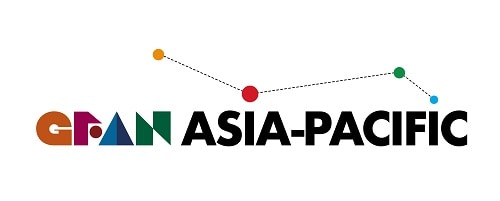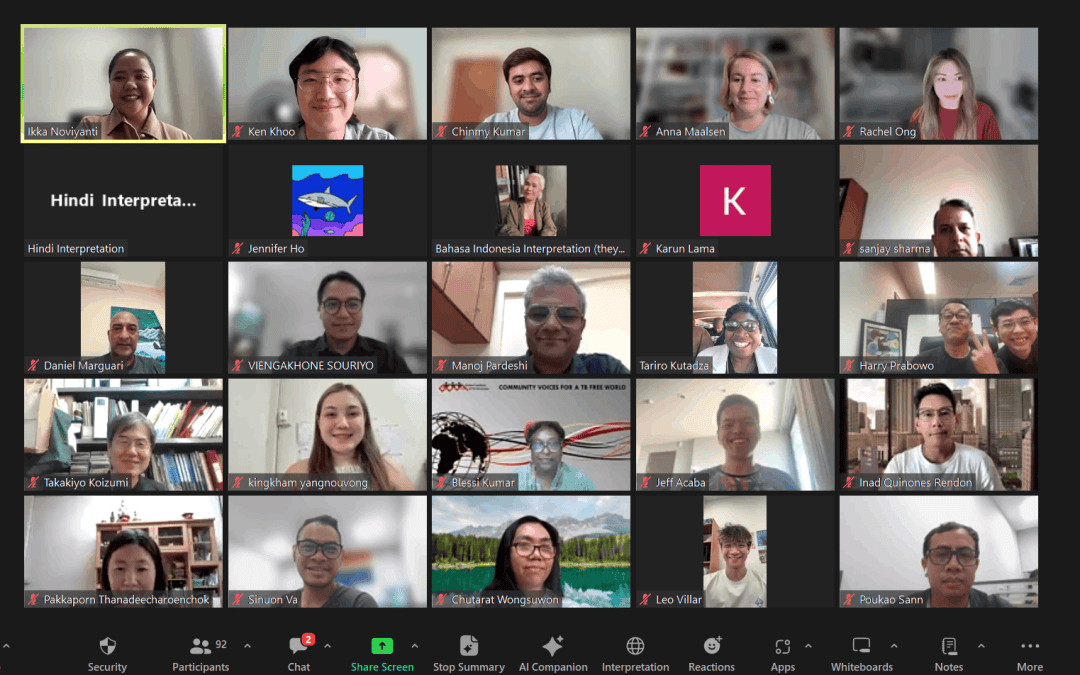On 6 June 2025, Global Fund Advocates Network Asia-Pacific (GFAN AP), Seven Alliance, Asia Pacific Regional Learning Hub (APRLH), and Frontline AIDS jointly organised a webinar call with community and civil society partners to discuss the Global Fund to Fight AIDS, Tuberculosis and Malaria (Global Fund) Grant Cycle (GC) 7 adaptations and what to expect next, including areas of on-going challenges and support needs in countries across the Asia Pacific.
The webinar aimed to provide information on the current context and overview of the grant adaptation measures for GC7 and remaining GC6; dive deeper into the proposed grant reprioritisation and revision; examine the impact, next steps and entry points for communities and civil society to influence this process; and provide space for open discussion to identify challenges and support needed.
The webinar was attended by over 100 community and civil society representatives and was moderated by Ikka Noviyanti (Regional Coordinator, Youth LEAD). The webinar was conducted in English, with simultaneous interpretation provided in Hindi and Bahasa Indonesia. Welcome remarks were delivered by Rachel Ong (Regional Coordinator, GFAN AP), Chinmy Kumar (Coordinator, APRLH), and Kanna Dharmarajah (Lead, HIV and Health Financing, Frontline AIDS) on behalf of the co-organisers.
1. Grant Reprioritisation and Revision Process for GC7 | Anna Maalsen (The Global Fund)
Anna Maalsen (Manager, Community, Rights and Gender (CRG), The Global Fund) began the discussion with a presentation on the GC7 reprioritisation process and revisions to Global Fund grants:
- This grant adaptation marks the first time the Global Fund has made a downward revision in grants mid-cycle. Throughout this process, the priority is working together to support principal recipients (PRs), country coordinating mechanisms (CCMs), community partners, technical partners, and stakeholders to optimise the usage of available funding.
- There are a series of approaches to mid-cycle grant adaptations:
- Deferring or pausing agreed activities: The purpose is to slow down spending and ensure there is sufficient funds for commitments.
- Repriorisation of Global Fund investments: Due to donor uncertainty, the Global Fund’s finance team has been pushing for advance commitments from other donors while calculating the percentage reduction needed for grant allocations. As of this call, this number is not yet available and will be communicated within the next month. Reprioritisation of grants will take place in June, July and August.
- Revision of grants: This will take place following the reprioritisation process, and be completed by the end of September.
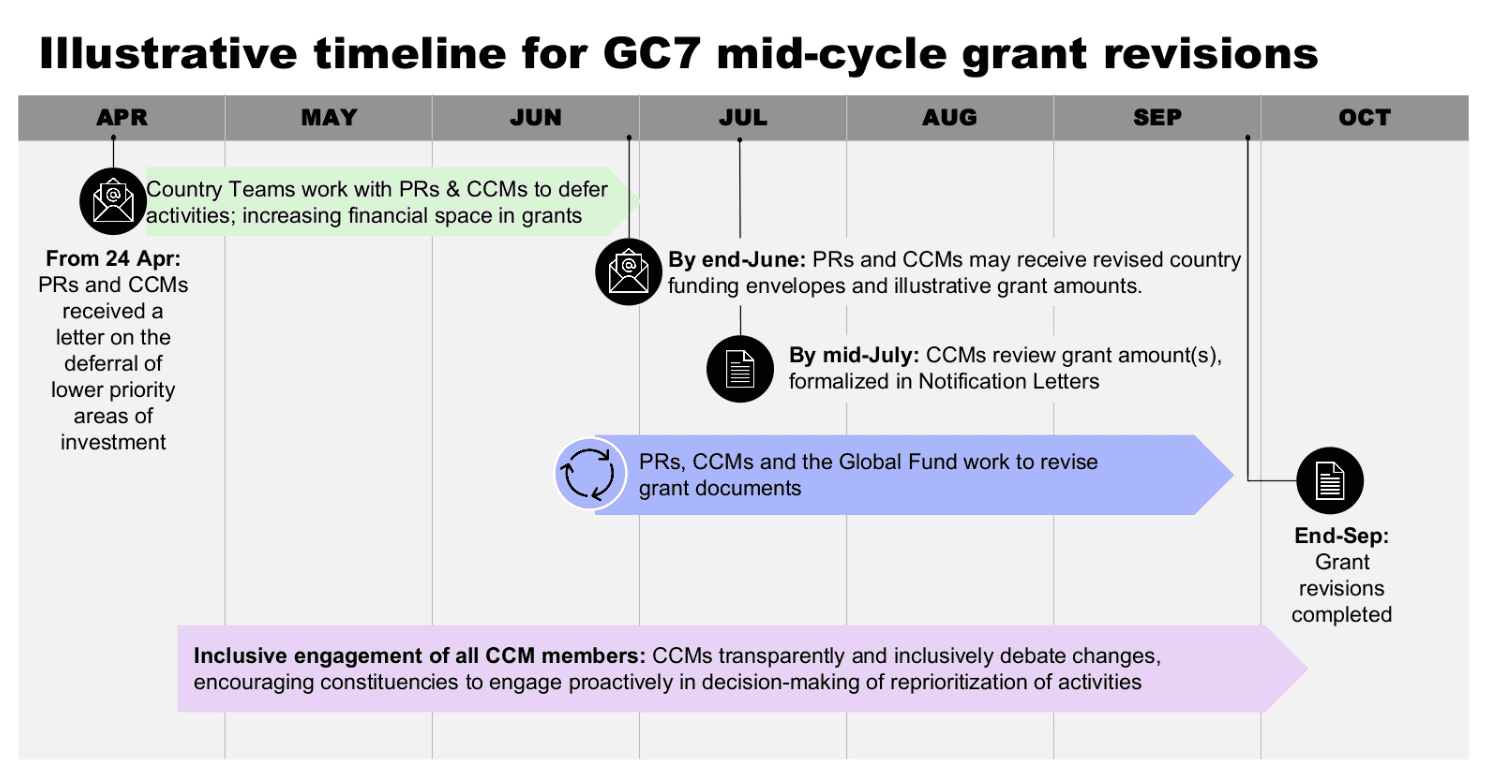
- During the grant reprioritisation process, if a country has multiple grants, there is an opportunity for CCMs to review illustrative grant amounts and make decisions to shift funds from one disease to another, to cater for significant gaps such as where there are high co-dependencies.
- During the two-week period after receiving the notification letters, CCMs are recommended to meet to discuss the allocations and either endorse on a no-objection basis or make changes to allocations, to be sent back to the Global Fund. The CCM Chair, Co-chair and civil society representative, if not one of those two positions, will need to endorse the allocations.
- Decisions on grant allocations need to be communicated back to the Global Fund Secretariat (GFS) by 19 August 2025.
- Once there is agreement on revised grant budgets, the PR will submit revised documents to GFS and CCMs to indicate shifts in modules, interventions, and implementation arrangements. At this point, GFS, CCM members, and technical partners involved would be able to spot any “red flags” of big shifts away from civil society and community implementers. Therefore, it is critical to advocate and ensure that these revisions and discussions are transparent.
- Access to lifesaving services for HIV, TB and malaria programmes must be preserved and core priorities must continue to be covered as much as possible within the reduced allocations, keeping in mind that community outreach and providers play essential roles in providing access and case management to key populations and vulnerable communities. Also important to consider are preserving interventions that remove barriers to accessing services and essential health and community systems.
- Country context is extremely important for programmatic reprioritisation. Decision making should be between all partners and stakeholders, i.e. governments, communities, stakeholders, and taking into account all sources of domestic and international funding. It must also take into account epidemiological and geographic contexts, engagement of community and technical partners, value for money, sustainability of supply, and service delivery factors.
- Reprioritisation priorities are not technical guidance, but rather an approach on how to order prioritisation around lifesaving health products and services while increasing cost effectiveness and efficacy.
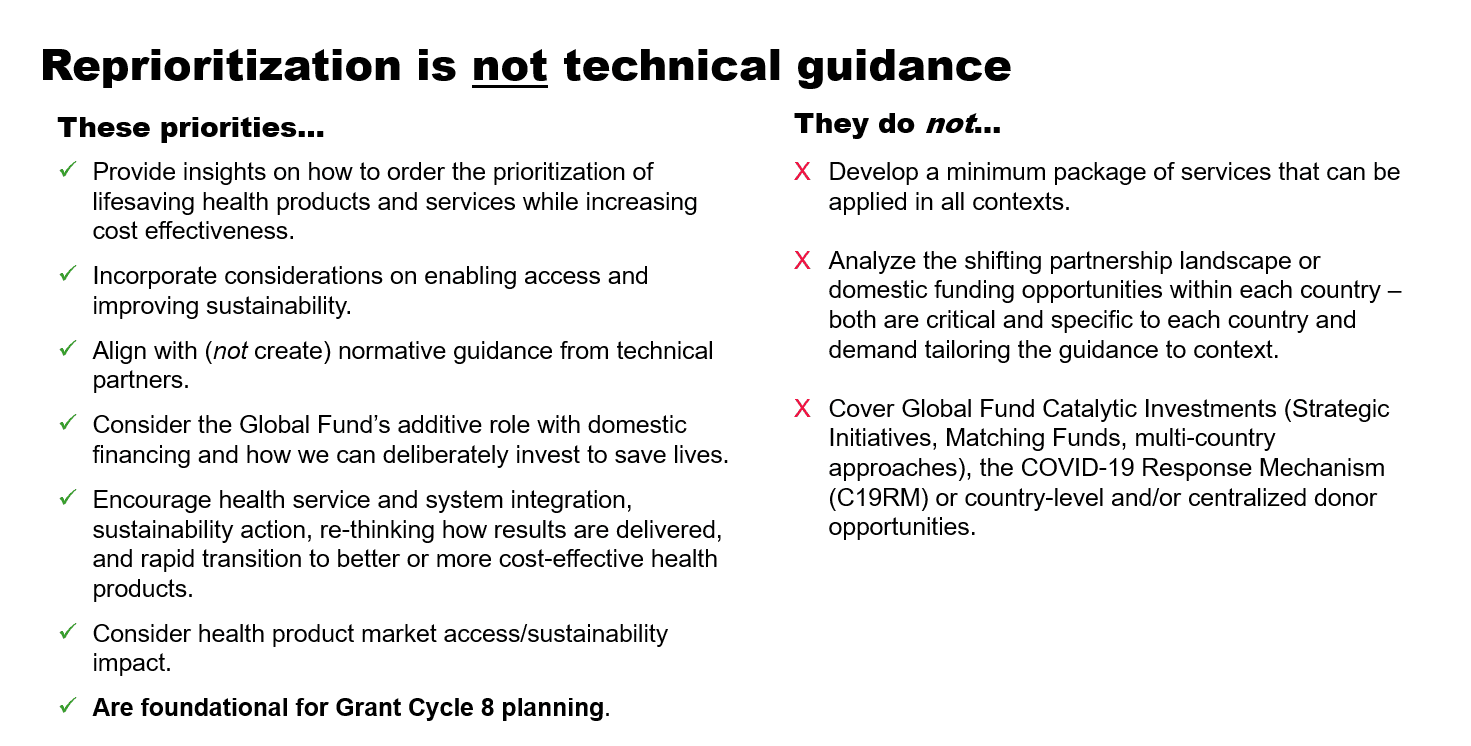
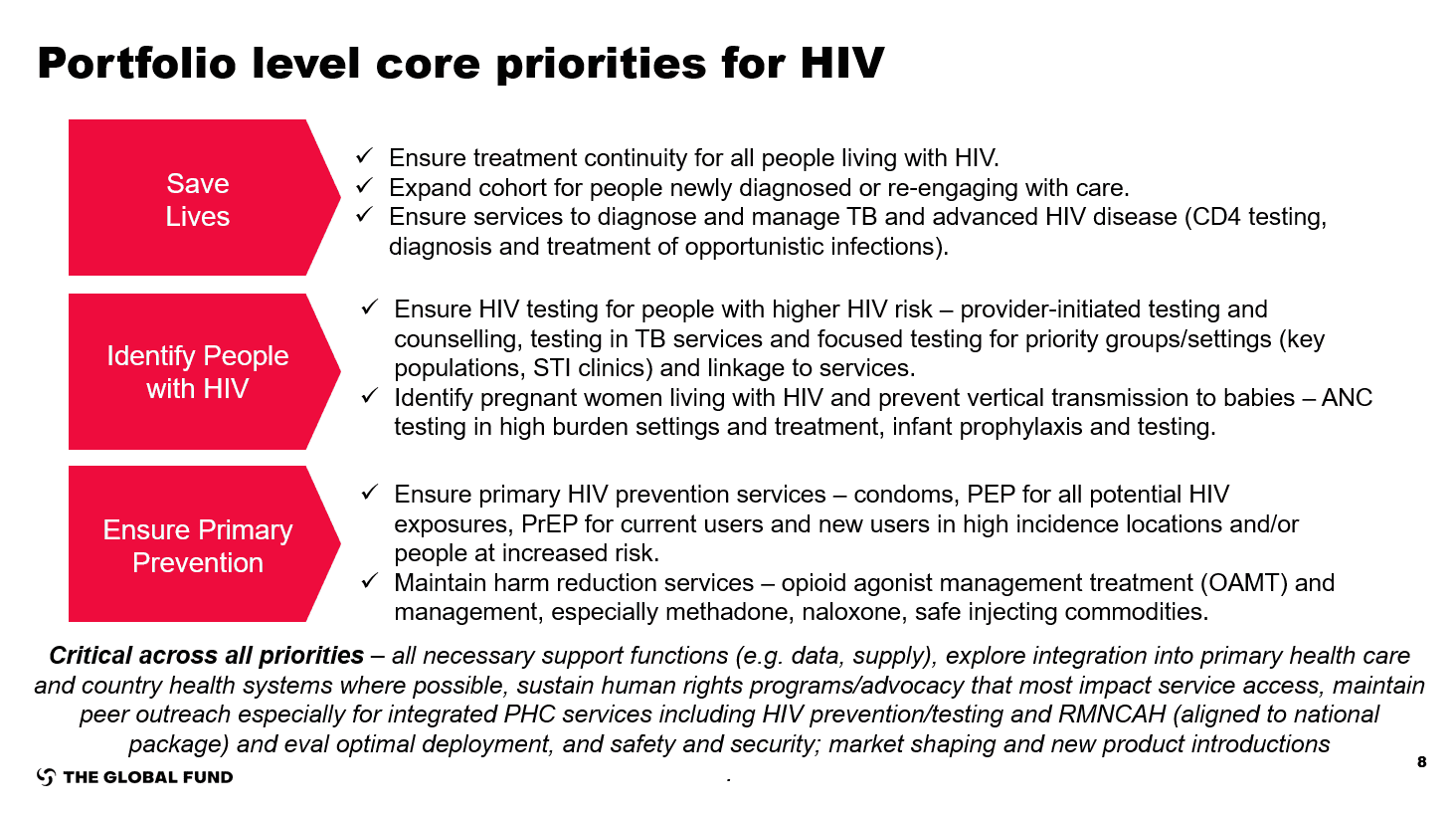
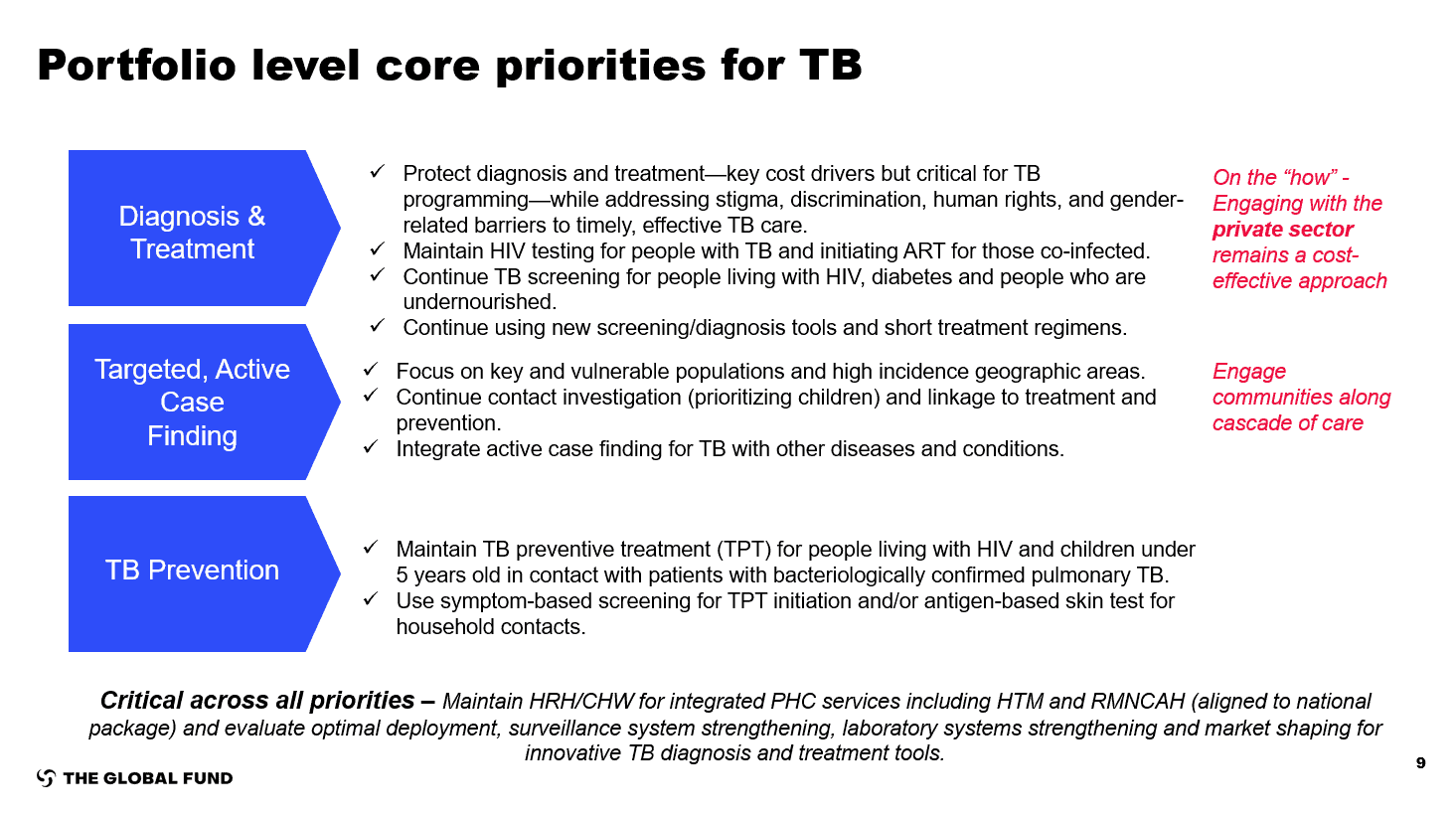
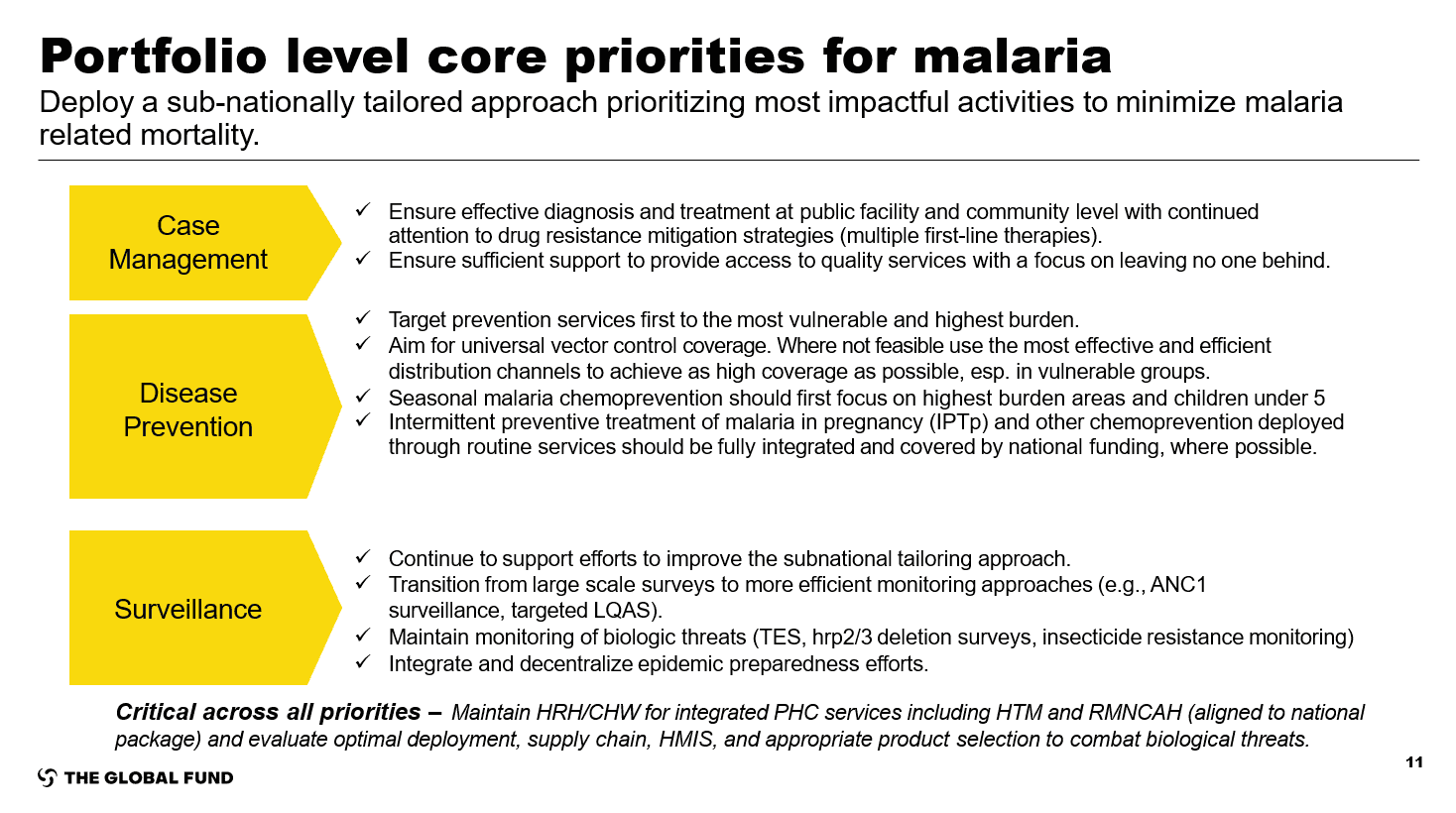
- The CRG team is working hard internally within the GFS and with country teams to push for the deliberate integration of resilient and sustainable systems for health (RSSH), human rights, gender and community systems across disease priorities. Quality services to deliver access to care requires investing in human resources including community health workers, as well as identifying human rights and gender-related barriers to health progress.
- Community-led monitoring (CLM) remains a priority area to provide real-time data on accessibility, contributing to improvements in linkage, referral and human rights support between formal and community health service delivery platforms. Therefore, if a country has not yet started CLM, it may still be added to the grant provided it is well-linked to improvements in access and quality of life-saving services.
- CRG also recommends continued and accelerated investments in the capacity development of community-led and community based organizations (CBOs) that support the delivery of life-saving services.
- CRG recommends maintaining peer cadres with fair enumeration and supervision to ensure quality, life-saving services, and where possible, expanding payrolls to cover multiple diseases and human rights. Peer paralegals and other legal redress mechanisms are vital, separate, and complementary components for improving access to justice where human rights barriers affect health access.
- Some avenues for support from the Global Fund are:
- The Community Engagement Strategic Initiative (CESI) in partnership with Frontline AIDS to support technical assistance (TA) up to 10 virtual TAs.
- Community guidance on reprioritisation is being finalised and learning hubs are an important part of the process in hosting webinars supporting technical guidance, dissemination of information, and support for rapid engagement in countries.
- The Human Rights Strategic Initiative, Gender Equity Fund, providing clarifications and troubleshooting calls, as well as maintaining an internal issues log around community engagement.
2. Questions and Answers
Daniel Marguari (Spiritia Foundation) provided an update on reprioritisation planning in Indonesia which had begun among PRs and CCM members, including Spiritia Foundation, using an unconfirmed estimated amount of 15% of grants deferred. Daniel also asked for more clarity around the reprioritisation process in June-July, as well as opportunities for communities and civil society to influence decisions around the reprioritisation envelopes.
Manoj Pardeshi (National Coalition of People Living with HIV in India) echoed Daniel’s question on opportunities for communities to be involved in country-level dialogues with the GFS, PRs and governments during the reprioritisation process, which he notes has also affected outreach workers in India.
Responding to Daniel, Anna confirmed that the timeline for CCMs to receive the notice letter will be no later than 30 June 2025, while the first two weeks of July will be for preparing for CCM engagements.
Responding to Manoj, Anna urged community implementers and partners to raise an immediate request for dialogue with country teams, as they have been briefed by GFS to engage with communities in the process. CRG can also support on dialogues where flagged by the grant management division, and will be doing a specific CCM session for civil society representatives on how to engage in the reprioritisation process, in partnership with the Communities Delegation during the next few weeks.
Shreehari Acharya (CSO Platform) asked about the Global Fund’s approach to grants where there is a lack of meaningful community engagement and representation at the CCM, particularly for malaria and tuberculosis (TB).
Melanie Hubault (Malaria Consortium) asked about the potential risks of having to reduce management costs in the very short term.
Anna responded that CRG has flagged internally the issue of poor malaria and TB community representation in CCMs and will be engaging on this with the CCM civil society representatives. Anna also urged technical partners in CCMs to support priorities equally across the three diseases. Acknowledging the resource constraints faced by TB programmes in the Asia Pacific, Anna emphasised that community representation and support for TB programming is critical and important to continue.
Anna also shared that while there are risks in reducing management costs, the reductions need to be proportional and take into account the lower overheads and core operational costs in civil society organisations, which should continue to be protected in grants. GFS will review the implementation changes and the CRG team is on standby to support if anything is flagged.
Sanjay Sharma (Blue Diamond Society) shared that in Nepal, with the takeover of USAID, Pepfar and Global Fund programmes, 21 CBOs have faced grant termination resulting in disruptions of HIV prevention, testing, and treatment services for key populations, and asked about ways for programme continuation. Sanjay also flagged that their organisation, as a sub-sub-recipient (SSR) of a human rights grant, has not yet signed the contract with the PR.
Viengakhone Souriyo (CHIAs Laos) asked about how the Global Fund would look at reallocating administrative costs of PRs, which tend to be high, to life-saving priorities instead. Vieng also raised a question about support for civil society during allocation negotiations in country contexts where governments prioritise themselves.
Chutarat Wongsuwon (Raks Thai Foundation) asked if the grant adaptation will allow a performance framework (PF) revision.
Responding first to Chutarat, Anna shared that currently there will not be a PF revision due to it being linked to National Strategic Plan (NSP) targets, though this continues to be discussed internally.
Responding to Sanjay, Anna acknowledged the challenges in Nepal and agreed to flag it with the CRG advisor, noting that key populations remain a critical priority for the Global Fund.
Responding to Vieng, Anna shared that TA support is available for specific cases to support community engagements with PRs, and acknowledged the power imbalance in these negotiations.
Daniel Marguari added further context to the reprioritisation process and potential challenges, including a power imbalance and lack of representation of community voices at the PR and CCM levels. Daniel asked if there is a mechanism for global communities to raise key asks and recommendations of minimum standards to GFS currently, or if it might be too late. Daniel also reiterated his question regarding any connections between the June notice letters and the committee meeting in July.
Anna responded that the revised allocations are guided by an internal qualitative adjustment process and there is no ability at the moment to influence this process from the outside. The notice letters will provide a revised indicative grant budget split, which would not deviate much from previous splits except in countries where there has been significant impact and co-dependency with US funding. Anna also emphasised that the revised budget split requires endorsement by the CCM Chair and Vice-chair, and if neither of the two are civil society representatives, a civil society representative is also required to sign on. This would be an opportunity for civil society engagement with the CCM in the reprioritisation process. Responding to Daniel’s second question, Anna shared that the Strategy Committee meeting in July is not connected to the June notice letters, though many of the Strategy Committee members have already been involved in the reprioritisation process.
3. Next Steps for Communities and Civil Society to Influence the Process and Availability of Technical Assistance and Resources | Chinmy Kumar (APRLH) & Kanna Dharmarajah (Frontline AIDS)
To start, Chinmy Kumar presented key points on community engagement in the reprioritisation process at the country level:
- It is important that communities carefully review the GC7 documents, detailed budgets, performance frameworks, guidelines, and programme implementation status through engagements with PRs, SRs, and SSRs.
- Ensure regular and meaningful communication between communities with CCM civil society representatives and be proactive in inquiring about opportunities to participate in the grant reprioritisation and review process.
- Establish a contact person within PRs and SRs to get timely updates and build opportunities to be more involved in meetings during this time.
- Coordinate community and civil society representatives and CBOs to prepare for CCM discussions and ensure early alignment on the priority issues. Conduct a community-wide review of grants to identify key priorities and opportunities to optimise and refocus our outreach.
- APRLH shares timely and relevant information on the reprioritisation through their newsletter and is organising a series of webinars on the reprioritisation process with partners.
- APRLH is also reaching out one-on-one at the country level with CCM members to discuss the reprioritisation, understand challenges, and provide support where possible. The APRLH is also a key point of contact for support in the Asia-Pacific region.
Next, Kanna Dharmarajah shared some input on community and civil society engagement:
- Consultations within countries on GC7 reprioritisation, if not on-going, must start immediately. Note that reprioritisation is a very different process from proposal development, and there is very limited technical assistance and funding available for consultations.
- Communities and civil society should proactively contact PRs and CCMs. The Global Fund’s Data Explorer webpage contains information on grants, and the Regional Learning Hubs would be able to share relevant information regarding grants and CCM members.
- Advocates are encouraged to join an upcoming call organised by CHANGE around GC7 updated timelines and reprioritisation, as one way to influence the reprioritisation process with the Global Fund.
- Advocates are also encouraged to connect with the Regional Learning Hub and the three Delegations (Communities Delegation, Developing Country NGO Delegation, and Developed Country NGO Delegation) for information and support.
Ikka Noviyanti raised a question for consideration: what kind of support would be most useful to all of us moving forward – whether technical assistance, strategic guidance, or community solidarity?
Daniel Marguari emphasised that the reductions in budget allocations will be applied to unspent budgets moving forward, with priority given to budget items related to the achievement or results of the performance framework. It is important to make this case to protect human rights and community-led programmes when engaging with PRs and CCMs.
Kanna also emphasised the importance of engaging with CCMs and civil society representatives in order to hold them accountable during this grant revision process.
4. Closing
The webinar concluded with closing remarks by Rachel Ong, Chinmy Kumar, and Kanna Devarajah, expressing appreciation for the proactive participation and information-sharing between participants and the need for discussions to continue beyond this call. The co-organisers also expressed their support for communities and civil society invited participants to reach out if they need any support during this time.
SPEAKERS:

Anna Maalsen
Manager, Community, Rights and Gender, The Global Fund
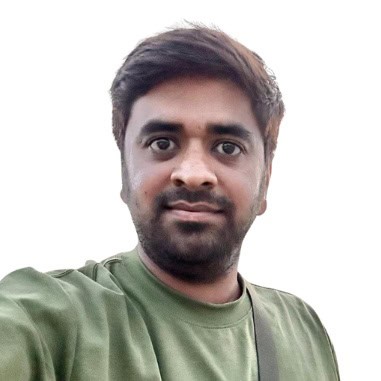
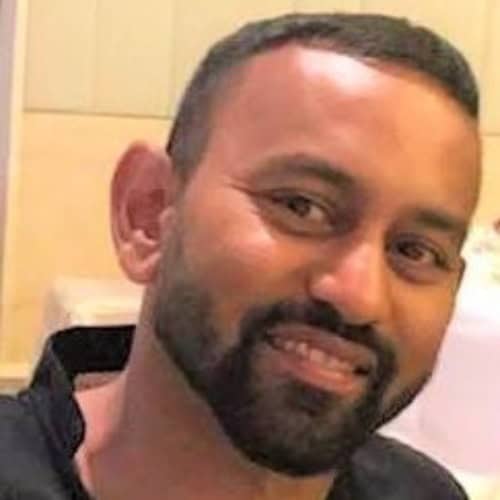
PRESENTATIONS:
-
- Programmatic Reprioritization & Revisions to Global Fund Grants (GC7). Presenter: Anna Maalsen, The Global Fund.
- Resources & Next Steps for Communities & Civil Society. Presenter: Revanta (Kanna) Dharmarajah, Frontline AIDS.
